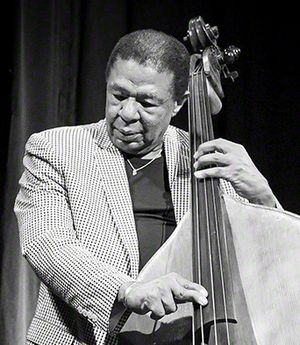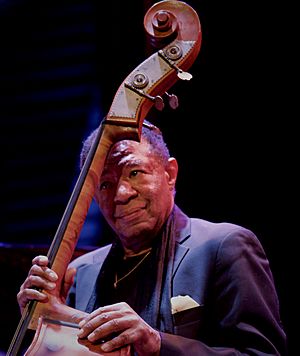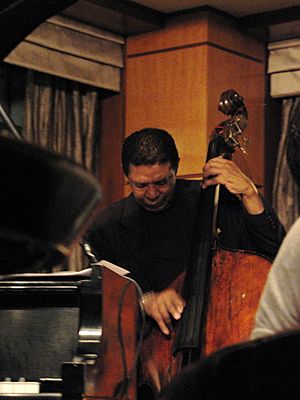Buster Williams facts for kids
Quick facts for kids
Buster Williams
|
|
|---|---|

Williams at Victoria during the 2016 Oslo Jazzfestival
|
|
| Background information | |
| Birth name | Charles Anthony Williams |
| Born | April 17, 1942 Camden, New Jersey |
| Genres | Jazz, jazz fusion |
| Occupation(s) | Musician |
| Instruments | Double bass |
| Years active | 1959–present |
Charles Anthony "Buster" Williams (born April 17, 1942) is a famous American jazz musician. He plays the double bass, which is a large string instrument. Buster Williams is well-known for playing with many legendary jazz artists. These include pianist Herbie Hancock in the 1970s and singer Nancy Wilson. He also played with the band Sphere, which honored the music of Thelonious Monk.
Contents
Buster Williams' Story
Early Life and Music
Buster Williams grew up surrounded by music. His dad, Charles Anthony Williams Sr., was a musician who played bass, drums, and piano. Their home in Camden, New Jersey, often had band rehearsals. This meant Buster heard jazz from a very young age. He was especially inspired to play the bass after hearing a song called Star Dust by Oscar Pettiford. Buster started playing the bass when he was a young teenager.
He got his first professional music job when he was still in junior high school. He filled in for his dad, who had two gigs at the same time. Later, Buster practiced a lot with Sam Dockery, a musician who played in Jimmy Heath's band. Buster's dad also hosted jam sessions, which are informal music gatherings, at a club called Rip's. In 1959, he gave Buster a chance to put his own band together for a show. Buster hired Sam Reed to try and get into Jimmy Heath's band. The plan worked! Reed soon asked Buster to play in his band, and then Jimmy Heath hired Buster the very next week.
After finishing Camden High School in 1960, Buster got to play with famous musicians Gene Ammons and Sonny Stitt. He toured with them for about a year. During this time, he made his first two recordings in August 1961. These albums were Dig Him! and Boss Tenors.
Learning More About Music
Buster Williams also studied music at Combs College of Music in Philadelphia. He learned important skills like how to compose music, understand music structure, and learn about harmony and theory. His teacher was Dr. Roland Wiggins.
Playing for Singers
Buster became a popular musician for singers. In 1961, Dakota Staton hired him after hearing him play. He then worked with Betty Carter in 1962 and Sarah Vaughan in 1963. Sarah Vaughan took him on his first tour to Europe. In 1964, he started a long-lasting partnership with Nancy Wilson. He recorded several albums with her and moved to Los Angeles. Throughout his career, Buster played with many other great singers.
Life on the West Coast
Moving to the West Coast helped Buster tour and record more often. He played with Nancy Wilson and also with The Jazz Crusaders. He recorded five albums with The Jazz Crusaders. Buster also often filled in for another famous bassist, Ray Brown. He played with many other musicians, including Miles Davis for several months in 1967.
Playing with Herbie Hancock
In 1968, Buster Williams moved to New York City. He continued to play with many top artists like Art Blakey and Mary Lou Williams. He also recorded for major record labels. Having worked with Herbie Hancock before, Buster became a key member of Hancock's Mwandishi Sextet. This group recorded several albums, including Mwandishi, Crossings, and Sextant. The Mwandishi Sextet explored new electronic sounds in jazz. Buster played both acoustic and electric bass in this group.
Leading His Own Music
Buster Williams released his first album as a band leader in 1975. It was called Pinnacle. Being a "leader" means he was in charge of the music and the band. He continued to lead several more recording sessions through 1980. He also played as a sideman, which means he supported other musicians. He worked with artists like Mary Lou Williams and Larry Coryell.
For many years, between 1980 and 1998, Buster only released one album as a leader. This album, Something More, came out in 1989. It featured famous musicians like Herbie Hancock and Wayne Shorter. It also included five original songs written by Buster. He still performs with a group called Buster Williams' "Something More." They toured Europe in 2013. Starting in 1998, Buster released more albums as a leader. His 2004 album, Griot Libertè, was recorded by the legendary engineer Rudy Van Gelder.
More Music Collaborations
Buster Williams was nominated for a Grammy Award for his work on the album Love For Sale. He also continued to tour with Herbie Hancock in the 1980s and 1990s. In 1982, Buster helped form two important groups. One was the Timeless All-Stars, a six-person band that recorded four albums. The other was Sphere. Sphere started as a tribute to Thelonious Monk, a famous jazz pianist. Their first recording was made on the day Monk passed away, February 17, 1982. Later, Sphere also played their own songs and other jazz favorites.
Recent Music Work
From 2010 to 2014, Buster Williams toured with Sonny Fortune, Mike Stern, and Jimmy Cobb. Their group was called "4 Generations of Miles." This name came from a 2002 concert that featured musicians from different eras of Miles Davis's bands.
Buster also started the Buster Williams School of Music. This grew from a summer class he taught in Camden in 2012. He created his own non-profit organization in 2013 to continue this important work. His "Something More" band performed at jazz festivals in 2014. He also toured Europe in March 2014 with the Steve Kuhn trio.
Film and TV Appearances
Buster Williams has worked on several movie soundtracks and even television commercials for big brands like Coca-Cola. In 1969, he played on the soundtrack for the film Mackenna's Gold, working with Quincy Jones. He also reunited with Ron Carter for the 1981 film Le Choix des Armes. In the 1990s, he worked on the music for Twin Peaks: Fire Walk with Me and the Spike Lee film Clockers.
Buster has appeared on television many times. He performed five of his own songs with Branford Marsalis' band on The Tonight Show. He also appeared on The Andy Williams Show with Nancy Wilson, and on Sesame Street with Joe Williams. In 2004, Buster appeared as himself in the Steven Spielberg movie The Terminal. He played in a jazz quartet in the film. In 2019, a documentary film called Buster Williams, From Bass to Infinity was released. It tells the story of his life, career, and ideas.
Personal Life
Buster Williams married his wife, Veronica, in 1965. They met in junior high school. As of 2014, they lived in Camden. In 1972, Buster and Veronica started practicing Nichiren Buddhist chanting. They began this practice after Veronica had a car accident. Buster has continued this practice ever since as a member of the global Buddhist group Soka Gakkai International. His 2004 album Griot Libertè was inspired by another health challenge when Veronica recovered from a coma.
Awards and Honors
Besides his Grammy nomination, Buster Williams has received several important awards. He was given a grant for composition from the National Endowment for the Arts. He also received a Fellowship Grant from the New York Foundation for the Arts in 1991. Other organizations have also recognized his contributions to music.
His Musical Gear
Buster Williams plays a special double bass. It is a copy of an old instrument from the late 1800s. He uses specific strings called La Bella strings and a Fishman BP-100 pickup to make the sound louder. He also uses a Polytone Mini-Brute bass amp to amplify his instrument.
Discography
As Leader
- Pinnacle (Muse, 1975)
- Crystal Reflections (Muse, 1976)
- Tokudo (Denon, 1978)
- Heartbeat (Muse, 1978)
- Dreams Come True (Buddah, 1980)
- Two as One with Kenny Barron (Red, 1987)
- Something More (In+Out, 1989)
- Somewhere Along the Way (TCB, 1998)
- Lost in a Memory (TCB, 1999)
- Live at the Montreux Jazz Festival 1999 (TCB, 2001)
- Houdini (Sirocco Jazz Ltd., 2001)
- Joined at the Hip (TCB, 2002)
- Griot Libertè (HighNote, 2004)
- 65 Roses (BluePort Jazz, 2008)
- Buster Williams Live Volume 1 (Buster Williams, 2008)
- Audacity (Smoke Sessions, 2018)
- Unalome (Smoke Sessions, 2023)
As Sideman (Selected)
Buster Williams has played as a sideman on many, many albums with a huge number of jazz artists. Here are some of the notable musicians he has recorded with:
- Gene Ammons
- Roy Ayers
- Chet Baker
- Kenny Barron
- Art Blakey
- Ron Carter
- Larry Coryell
- Sonny Fortune
- Benny Golson
- Dexter Gordon
- Herbie Hancock
- Eddie Henderson
- Shirley Horn
- Bobby Hutcherson
- The Jazz Crusaders
- Steve Kuhn
- Harold Land
- Charles Lloyd
- Frank Morgan
- David "Fathead" Newman
- Wallace Roney
- Jimmy Rowles
- Woody Shaw
- Sphere
- Steve Turre
- Stanley Turrentine
- McCoy Tyner
- Cedar Walton
- Mary Lou Williams
- Nancy Wilson
- Denny Zeitlin
See also
 In Spanish: Buster Williams para niños
In Spanish: Buster Williams para niños
 | Frances Mary Albrier |
 | Whitney Young |
 | Muhammad Ali |



